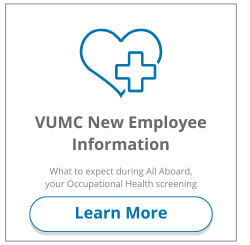The Occupational Health Clinic (OHC) provides comprehensive Occupational Medicine programming to Vanderbilt workforce members. This includes medical care for work-related illness and injury, as well as minor, non-work-related illnesses. OHC also provides medical surveillance for work-related hazards as well as exposure evaluations, ergonomic assessments, and new employee immunization and screening services as appropriate for safe employment at VU and VUMC.
ohcHomePage
Contact Us
Vanderbilt Health & Wellness - (615) 936-0961
Occupational Health Clinic - (615) 936-0955
Work/Life Connections-EAP - (615) 936-1327
Health Plus - (615) 343-8943 (Leave message and Health Plus will call you back).
Contact Us
Occupational Health Clinic
1211 21st Ave. South
Suite 640 Medical Arts Building
Nashville, TN 37212
(615) 936-0955
(615) 936-0966 fax
Email



